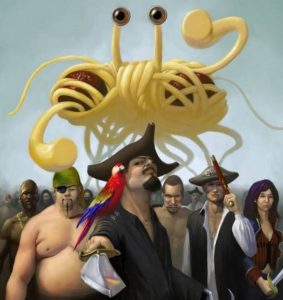My daily work includes writing a book on judicial notice, the doctrine whereby courts and administrative tribunals accept certain matters as “factual” (because they’re notorious or subject to ready verification) although they are not put forward according to the rules of evidence. Courts have noticed, for example, that the floors in banks can be slippery when it snows, and that older people generally have a harder time finding work. While the book is only about a third completed and the doctrine dates from the middle ages, I’m certain that a case decided just last month provides the most remarkable example: The Gospel of the Flying Spaghetti Monster.
Stephen Cavanaugh has argued before the United States District Court that officials at the Nebraska State Penitentiary, where he is an inmate,* violate his constitutional right to religious expression: the prison has refused to let him practise Pastafarianism, more formally known as FSMism and the Church of the Flying Spaghetti Monster.
The Abraham and Moses of Pastafarianism is Bobby Henderson, who founded the church in 2005, when he was 25, in an open letter to the Kansas Board of Education. As a sort of rear-guard assault on the teaching of “intelligent design” in Kansas schools, the letter proposes that the curriculum should include Pastafarianism as well. Given that intelligent design purports to be scientific despite the absence of verifiable evidence to support it (as opposed, say, to the Darwinian theory of evolution or Newtonian theory of gravity), the argument goes that one such theory is as good as another, and therefore deserves equal time.
Pastafarianism, Henderson explains, is “today’s fastest-growing carbohydrate-based religion,” and he notes that it serves to dispel “such malicious myths as Evolution (only a theory), science (only a lot of theories), and whether we’re really descended from apes (fact: Humans share 95 percent of their DNA with chimpanzees, but they share 99.9 percent with Pirates!).” Its creed holds that the universe is ruled by the Flying Spaghetti Monster (the FSM of FSMism), whose sovereignty is acknowledged by believers who, inter alia, “pirate-speak” while wearing Long John Silver costumes, eat a great deal of spaghetti (also styled as taking communion), and celebrate noodlecentric holidays such as Pastover and Ramen Dan.
So much for ritual. As for the science validating the doctrine (in the vein of intelligent design), apparently it is more than an article of faith that gravity is caused by the Monster’s pushing down on us with His Noodly Appendages, and that global warming is caused by the “decreasing number of pirates on the high seas.”
District Court Judge John M. Gerrard has proved to be the Doubting Thomas in all this, ruling that Pastafarianism is not a religion “within the meaning of the relevant federal statutes and constitutional jurisprudence.” Rather, it constitutes “a parody, intended to advance an argument about science, the evolution of life, and the place of religion in public education.” Nor does the penitentiary “substantially burden” Cavanaugh in the “exercise” of Pastafarianism, the purported encumbrance apparently being denial of his right to wear religious costume, said pirate gear.
Over the years, courts have taken judicial notice that beer is “not necessarily hurtful, any more than the use of lemonade or ice-cream” (Beebe v. The State, 6 Ind. 501, 519 (1855)), and that “it has never been said” that tobacco’s “preparation and manufacture into cigars were dangerous to the public health” (Jacobs’s Case, 98, N.Y. 98, 113 (1885). As well, there was a time when judges would have noticed without supporting evidence, accurately and soberly, that racial discrimination was lawful, extending even to human slavery. So perhaps applying the doctrine here is not as strange as it first appears. Explicitly stating that he does not pass judgment on the sincerity of Cavanaugh’s belief, Judge Gerrard takes judicial notice of its foundational document, The Gospel of the Flying Spaghetti Monster, which was not entered formally into evidence:
The Court has considered whether it is appropriate to consider this text, given the procedural posture of this case. But the Court finds that it is judicially noticeable – the contents of the book are capable of certain verification, … and Cavanaugh’s complaint expressly refers to the text as a basis for his claims. … Given Cavanaugh’s reliance on the book, the Court views judicial notice of it as effectively the same as taking judicial notice of the Bible. …
… and, presumably, of Charles Darwin’s On the Origin of Species.
* Cavanaugh is serving two to four years for attempted first-degree assault with a hatchet, and one to two years, consecutive, on a weapons conviction related to the hatchet.


